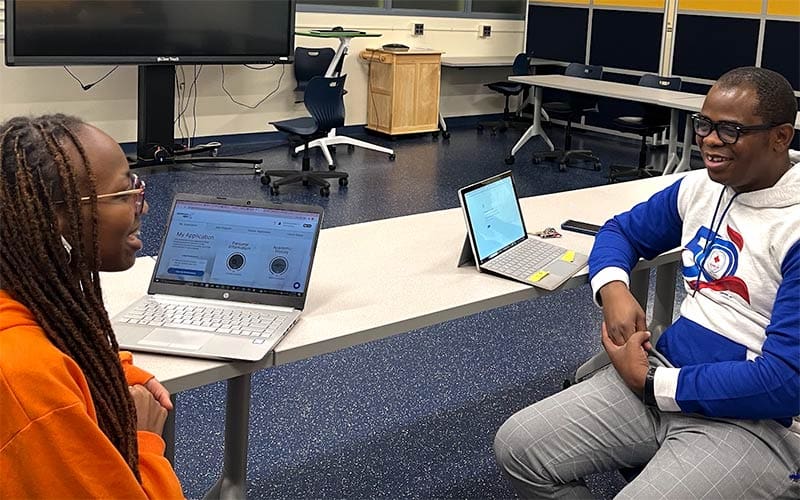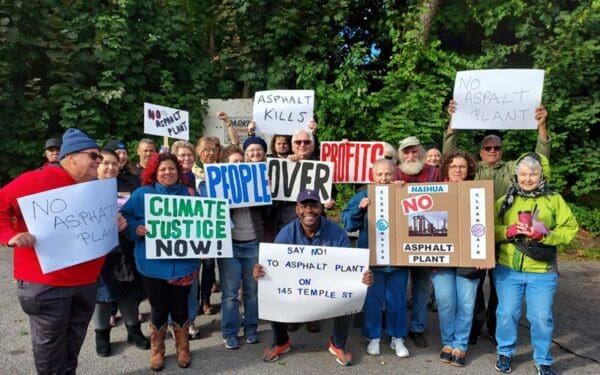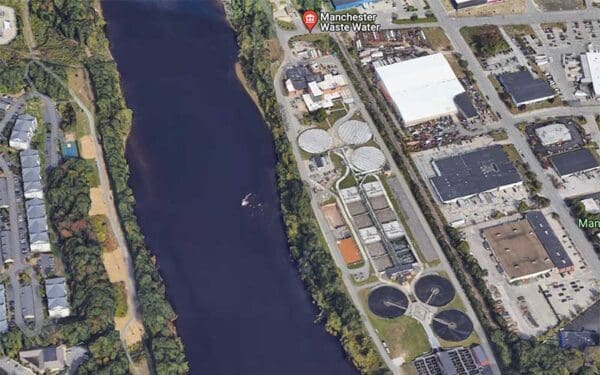
Resident researchers collaborate on their podcast. Photo: Shinelle Kirk
When the communities bearing the brunt of climate change are studied, it can often look like this: Academics parachute in, quiz anonymous residents on their experiences, and then turn the data into dry reports that get hidden behind paywalls. The study’s subjects aren’t credited for their expertise and never benefit from the knowledge derived from their lives.
The Healthy Neighborhoods Study (HNS) is flipping the script. This study, implemented with support from CLF, MIT, and the Robert Wood Johnson Foundation, uses the Participatory Action Research model, which recruits residents to be researchers. Instead of treating residents as “subjects,” this model treats them as experts in their own communities and experiences.
They are involved in every stage of the project, from designing the study and conducting the research to using the results to create change. “The integral part is involving others. We work with others, not work on others,” explained one researcher. The HNS podcast project in Brockton is a powerful example of this approach in action.
Tackling Gentrification Through Storytelling
Brockton is a historically working-class community south of Boston, known for having a diverse population that has welcomed many waves of immigrants. The Brockton Healthy Neighborhoods Study revealed that intersecting forces of gentrification, racism, poverty, and other forms of systemic oppression were leading to widespread displacement and hardship for residents. The researchers who partnered with CLF to run the study were Massasoit Community College students. They decided to create a podcast focusing on gentrification since the issue was relevant to their own lives.
As one researcher, Arielle, says: “I’ve lived in Brockton my entire life. I’ve seen how hard my neighbors and other residents have worked. They deserve to have their voice not only heard but utilized to pave the future of the city.”
The podcast embodies the spirit of the Participatory Action Research model by featuring and centering the experiences of Brockton residents. Over three episodes, student resident researcher Onyinyechukwu (Onyi) Okoroji interviews three residents, who chose to remain anonymous, about gentrification. All three worry about rising rents and an increase in luxury housing in the traditionally working-class area. One wryly notes that Starbucks are beginning to spring up in her neighborhood – a surefire indicator of gentrification creeping in.
Telling Inclusive Stories of Brockton and the Residents Who Love It
The episodes also delve into the parts of Brockton that the podcast participants love and explore possible solutions to the challenges that Brockton is facing. One 20-year-old lifelong resident questions the city’s reputation for being “dangerous.” Another talks about the advantages of living on a public transit route that allows a quick commute into Boston.
An interviewee who uses a Section 8 voucher to help her afford rent discusses possible policy changes that would strengthen the program and make it more accessible. She also celebrates the diversity and multiculturalism that she sees in her own neighborhood.
Residents also recount their experiences with racism, colorism, classism, and other forms of systemic oppression. The 20-year-old resident describes watching a realtor question her darker-skinned father’s ability to purchase a nicer home. The woman with a Section 8 voucher says that she’s been illegally denied housing as a result.
The third describes how landlords often neglect low-income renters, citing the history of redlining that historically forced families of color into poorer quality housing. She illustrates her point with a story from her own life: Her mother’s apartment doesn’t have running water, and her landlord is refusing to help. This combination of history and direct experience highlights the value of the HNS’ approach to research. Because the interview spotlighted a person with both data and lived experience at their fingertips, they were able to share both research and a compelling personal story.
The Power of a Personal Connection
The student researchers chose to engage with gentrification because it was deeply personal to them. “We have students here who have been through terrible experiences with housing,” one student noted.
In fact, one of the participants became unhoused while working on the project, along with her two young children. The HNS team stepped in to help her and she ultimately found housing again. “I was just very appreciative of the way that the people who run the Healthy Neighborhoods Study were able to help us figure out what to do,” said one researcher. “That community is an incredible community. It’s very special.”
The podcast project proves that the HNS community is “very special” because Brockton is very special. The podcast is building solidarity around the issues of gentrification and housing. Many people who are impacted by these issues believe that “it’s just happening to me,” said one researcher. “[When] you have people share experiences with each other, suddenly they realize it’s not individual, it’s more systemic.” When resident researchers are empowered to share their stories, it can create meaningful change.




